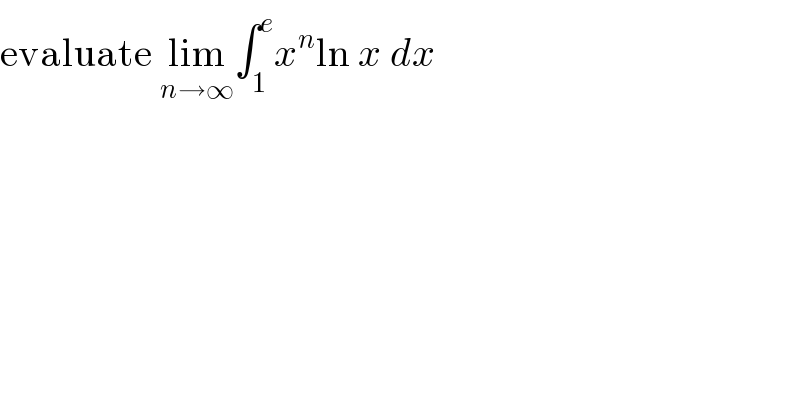
Question and Answers Forum
Question Number 100215 by Rio Michael last updated on 25/Jun/20

Commented by Dwaipayan Shikari last updated on 25/Jun/20

Answered by Ar Brandon last updated on 25/Jun/20
![Let I=∫_1 ^e x^n lnxdx let { ((u=lnx)),((dv=x^n dx)) :}⇒ { ((du=(1/x)dx)),((v=(x^(n+1) /(n+1)))) :} ⇒I=[(x^(n+1) /(n+1))∙lnx]_1 ^e −(1/(n+1))∫_1 ^e x^n dx=(e^(n+1) /(n+1))−[(x^(n+1) /((n+1)^2 ))]_1 ^e ⇒I=(e^(n+1) /(n+1))−(e^(n+1) /((n+1)^2 ))+(1/((n+1)^2 )) lim_(n→∞) (I)=lim_(n→∞) {(e^(n+1) /1)−(e^(n+1) /(2(n+1)))}=lim_(n→∞) {e^(n+1) −(e^(n+1) /2)} =lim_(n→∞) {(e^(n+1) /2)}=+∞](Q100224.png)
Commented by DGmichael last updated on 25/Jun/20
�� LIATE
Commented by Ar Brandon last updated on 25/Jun/20
Ouais�� c'est ça.
Answered by mathmax by abdo last updated on 25/Jun/20
![A_n =∫_1 ^e x^n lnx dx changement lnx =t give A_n =∫_0 ^1 e^(nt) t e^(t ) dt =∫_0 ^1 t e^((n+1)t) dt =[(1/(n+1))t e^((n+1)t) ]_0 ^1 −∫_0 ^1 (1/(n+1))e^((n+1)t) dt =(e^(n+1) /(n+1)) −(1/((n+1)^2 ))[e^()n+1)t) ]_0 ^(1 ) =(e^(n+1) /(n+1))−(1/((n+1)^2 ))(e^(n+1) −1) =(e^(n+1) /(n+1))−(e^(n+1) /((n+1)^2 )) +(1/((n+1)^2 )) =(((n+1)e^(n+1) −e^(n+1) )/((n+1)^2 )) +(1/((n+1)^2 )) =((ne^(n+1) )/((n+1)^2 ))+(1/((n+1)^2 )) ⇒ lim_(n→+∞) A_n =lim_(n→+∞) ((ne^(n+1) )/((n+1)^2 )) =+∞](Q100229.png)
